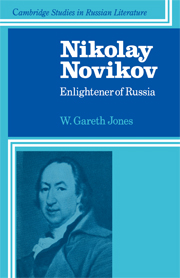Book contents
- Frontmatter
- Contents
- Acknowledgements
- Foreword
- 1 Noble beginnings (1744–69)
- 2 A family of satirical weeklies (1769–73)
- 3 The Drone (1769–70)
- 4 Imperial patronage (1770–3)
- 5 In search of the Russian reader (1773–5)
- 6 Disillusions and doubts (1774)
- 7 The historian (1773–91)
- 8 The freemason (1775–80)
- 9 A move to Moscow (1779–83)
- 10 The Russian reader discovered (1779–82)
- 11 The Typographical Company (1784–91)
- 12 Martyrdom and meditation (1791–1818)
- Afterword
- Notes
- Bibliography
- Index
10 - The Russian reader discovered (1779–82)
Published online by Cambridge University Press: 05 November 2011
- Frontmatter
- Contents
- Acknowledgements
- Foreword
- 1 Noble beginnings (1744–69)
- 2 A family of satirical weeklies (1769–73)
- 3 The Drone (1769–70)
- 4 Imperial patronage (1770–3)
- 5 In search of the Russian reader (1773–5)
- 6 Disillusions and doubts (1774)
- 7 The historian (1773–91)
- 8 The freemason (1775–80)
- 9 A move to Moscow (1779–83)
- 10 The Russian reader discovered (1779–82)
- 11 The Typographical Company (1784–91)
- 12 Martyrdom and meditation (1791–1818)
- Afterword
- Notes
- Bibliography
- Index
Summary
Novikov was not a bookseller: getting rich by selling books was never his aim.
BelinskyHe traded in books as a rich Dutch or English merchant trades in the produce of all lands …
KaramzinAs a publisher, bent on creating and serving an expanding market for books in Russian, Novikov's most immediate problem was to obtain sufficient copy to feed his presses. Until now he had always been able to produce his own material, but the scale of his new enterprise was too great for that. Translations – predictable in their appeal – formed the bulk of the output in his first few months to the end of 1779, and, although no definite plan of publishing was discernible by the year's end, the preponderance of translations was to persist until the end of the decade. The translators were found through the connections of his Moscow friends and soon among the students of the University. One early sign of the patronage that was later to flow to the students was the translation in 1779 of a German work, Curiosities of Nature, by Alexander Lyzhin, ‘Student of the Moscow Imperial University’. Noteworthy among the translations the following year were the versions from the French by Ambrose, Prefect of the Moscow Academy, of Milton's Paradise Lost which was dedicated to Archbishop Plato, the translation of Blackstone on English law by S. Desnitsky who had graduated from Glasgow University, a work printed at the expense of Catherine's Cabinet, and also Desnitsky's translation of Thomas Bowden on agriculture.
- Type
- Chapter
- Information
- Nikolay NovikovEnlightener of Russia, pp. 165 - 176Publisher: Cambridge University PressPrint publication year: 1984



